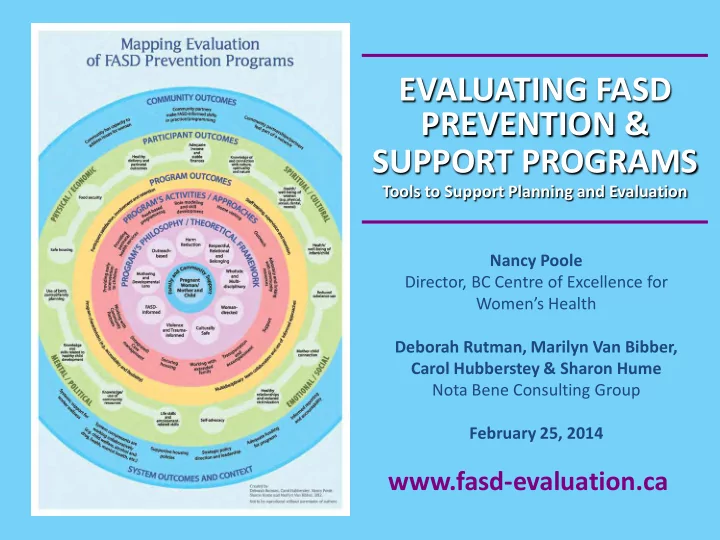

EVALUATING FASD PREVENTION & SUPPORT PROGRAMS Tools to Support Planning and Evaluation Nancy Poole Director, BC Centre of Excellence for Women’s Health Deborah Rutman, Marilyn Van Bibber, Carol Hubberstey & Sharon Hume Nota Bene Consulting Group February 25, 2014 www.fasd-evaluation.ca
Project Sponsor: British Columbia Centre of Excellence for Women’s Health Project funder: The Public Health Agency of Canada’s Fetal Alcohol Spectrum Disorder (FASD) National Strategic Project Fund The views expressed do not necessarily represent those of PHAC. For more information, please contact: BC Centre of Excellence for Women’s Health - http://bccewh.bc.ca Nota Bene Consulting Group - notabenegroup@shaw.ca www.fasd-evaluation.ca
AGENDA 1. Overview of project 2. Intro to the Evaluation Approach and Maps 3. Intro to the Website Q&A 4. Program Philosophy & Evaluation 5. Case Example: Participant & Community Outcomes Q&A and Discussion
PROJECT OBJECTIVES This three-year project (ending March 31, 2014) has aimed to: Create common evaluation frameworks and identify promising methods and tools for FASD programs serving pregnant women and mothers, youth and adults living with FASD, and FASD programs in Aboriginal communities Support the capacity of community-based organizations to undertake evaluation
Why focus on evaluation? What can evaluation do to improve FASD programming? We believe that evaluation is a means to: Reflect/ • Learn about how a particular model Implement Learn/Adjust works with the population • Learn about how program Evaluate/ Implement Learn/ improvements can be made each year /Monitor Decide • Learn how new outcomes and outcome measures may be identified Reflect/ Learn/ Plan • Learn what difference the program is Decide/ Adjust making for participants, providers, Implement communities, and service systems /Monitor • Inform evidenced-based decision- making (e.g. re: funding, planning)
We created visual maps that include: Theoretical/philosophical foundations of programs Program activities and program/formative outcomes Participant outcomes Community outcomes & context Systemic outcomes
FASD Programs in FASD Support Programs Aboriginal Communities
Website Overview www.fasd-evaluation.ca
Resource Guides There are two resource guides available on the website: 1. An Intro to the Visual Maps 2. Using Program Philosophy as a Foundation to FASD Evaluation
Introduction to the Visual Maps Includes Organizational Reflection and Assessment Questions and examples of how others are using the maps
10 Key Philosophy/Theoretical Frameworks www.fasd-evaluation.ca
Q&A
Using Program Philosophy as a Foundation for Evaluation Describing the philosophy and theoretical framework of your program can increase learning about questions such as: Why are we doing things in a particular way? Are we doing the right things? Does our approach continue to be responsive to the needs of our program participants?
Linking Program Philosophy, Activities/Approaches and Program Outcomes Program Activities/Approaches: Important to uncover and highlight Which aspects of your program are activities that are sometimes contributing to positive outcomes - ‘invisible ’ including having participants (continue to) engage? Examples of Program Outcomes: Participants feel safe; welcome; safe; respected Participants take part in decision making Program is accessible Program is flexible Staff have training, support & supervision Staff employ informed approaches Team works collaboratively
Mapping Evaluation: Participant Outcomes Participant Outcomes organized by: Each section can be downloaded and includes: Health and Well-being (of mother & Short-term, intermediate and child) long-term outcomes Housing & Income support Indicators of outcomes Knowledge & skills Measurement tools and Relational & spiritual development resources
Participant Outcome Example: Self-confidence, self-esteem & hope
Participant Outcome Example: Self-confidence, self-esteem & hope
Mapping Evaluation: Community & Systems Outcomes Community Outcomes – Examples Systems Outcomes – Examples Community partners feel part of a Supportive housing policies network Informed reporting and accountability Community partners have knowledge of FASD Community partners make FASD- informed shift in practice/programming Community has capacity to address issues for women
Q&A
Project Sponsor: British Columbia Centre of Excellence for Women’s Health Project funder: The Public Health Agency of Canada’s Fetal Alcohol Spectrum Disorder (FASD) National Strategic Project Fund The views expressed do not necessarily represent those of PHAC. For more information, please contact: BC Centre of Excellence for Women’s Health - http://bccewh.bc.ca Nota Bene Consulting Group - notabenegroup@shaw.ca www.fasd-evaluation.ca
Recommend
More recommend